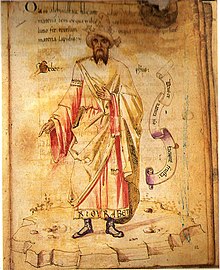Geber
Jābir ibn Ḥayyān (Arabic: جابر بن حيان; Latin: Geber; died between 806 and 816),[1] is the name for the writer of a great number of writings in Arabic. The writings together have the name Jabirian corpus.[2] The most important subjects of these writings are: alchemy, cosmology, numerology, astrology, medicine, magic, mysticism, and philosophy.

Jabir's writings have in them the oldest known list of chemical substances. For the first time, the writings gave an explanation of how to produce an inorganic substance (ammonium chloride) from organic substances (such as plants, blood, and hair).[3]
Modern scholars doubt the historical existence of Jabir. It is probable that one person did not write all of the writings in the Jabirian corpus. Instead, scholars see Jabir ibn Hayyan as a pseudonym that a group of writers used.[4]
Translations into Latin of some of Jabir's Arabic writings (like the "Book of Mercy", and the "Book of Seventy") came into existence in the Middle Ages. In Latin, Jabir had the name "Geber", a transliteration of "Jabir".[5]
In 13th-century Europe an anonymous writer, called pseudo-Geber, started to produce new writings about alchemy under the name Geber.[6] People still read the Summa perfectionis magisterii in the 17th century. The Summa perfectionis magisterii was one of the writings that pseudo-Geber produced in the 13th century. It was an influence on early modern chemists like Robert Boyle (1627–1691).[7]
References
change- ↑ Delva 2017, pp. 36−37, note 6.
- ↑ Plessner 1981; Forster 2018.
- ↑ Stapleton, Azo & Hidayat Husain 1927, pp. 338–340; Kraus 1942–1943, vol. II, pp. 41–42.
- ↑ Delva 2017; Forster 2018.
- ↑ Forster 2018.
- ↑ Newman 1985.
- ↑ Newman 2006.
Works cited
change- Delva, Thijs (2017). "The Abbasid Activist Ḥayyān al-ʿAṭṭār as the Father of Jābir b. Ḥayyān: An Influential Hypothesis Revisited". Journal of Abbasid Studies. 4 (1): 35–61. doi:10.1163/22142371-12340030.
- Forster, Regula (2018). "Jābir b. Ḥayyān". Encyclopaedia of Islam, Three. doi:10.1163/1573-3912_ei3_COM_32665.
- Kraus, Paul (1942–1943). Jâbir ibn Hayyân: Contribution à l'histoire des idées scientifiques dans l'Islam. I. Le corpus des écrits jâbiriens. II. Jâbir et la science grecque. Cairo: Institut français d'archéologie orientale. ISBN 9783487091143.
- Newman, William R. (1985). "New Light on the Identity of Geber". Sudhoffs Archiv. 69 (1): 76–90. JSTOR 20776956. PMID 2932819.
- Newman, William R. (2006). Atoms and Alchemy: Chymistry and the Experimental Origins of the Scientific Revolution. Chicago: University of Chicago Press. ISBN 9780226576978.
- Plessner, Martin (1981). "Jābir Ibn Hayyān". In Gillispie, Charles C. (ed.). Dictionary of Scientific Biography. Vol. 7. New York: Charles Scribners’s Sons. pp. 39–43.
- Stapleton, Henry E.; Azo, R. F.; Hidayat Husain, M. (1927). "Chemistry in Iraq and Persia in the Tenth Century A.D". Memoirs of the Asiatic Society of Bengal. VIII (6): 317–418. Bibcode:1927Natur.120..242J. doi:10.1038/120242a0. S2CID 4093082.